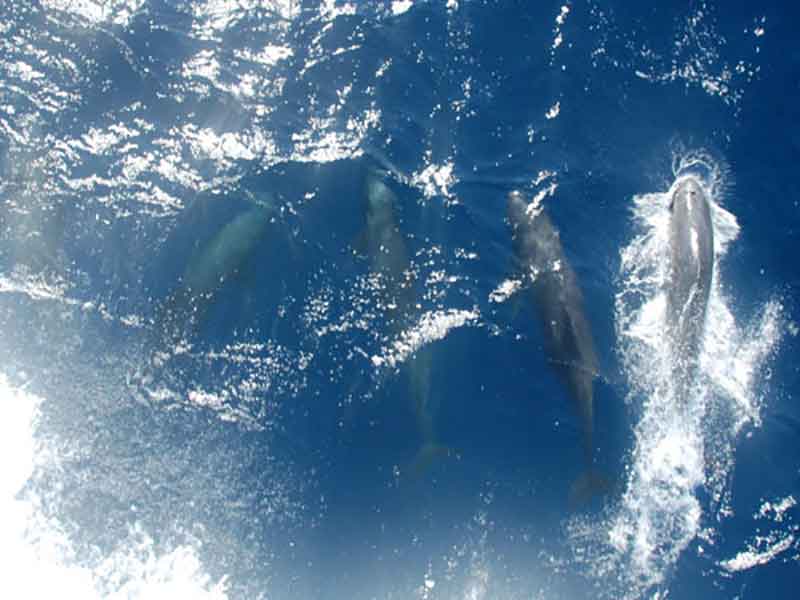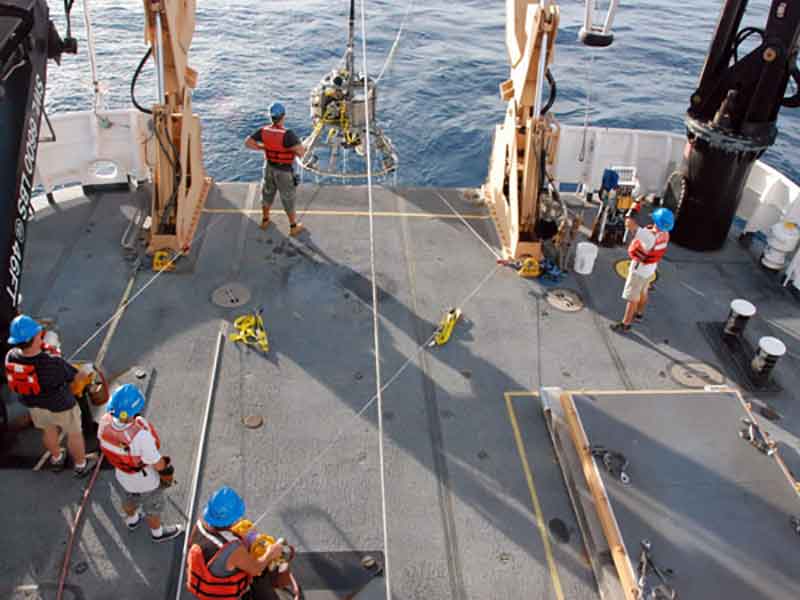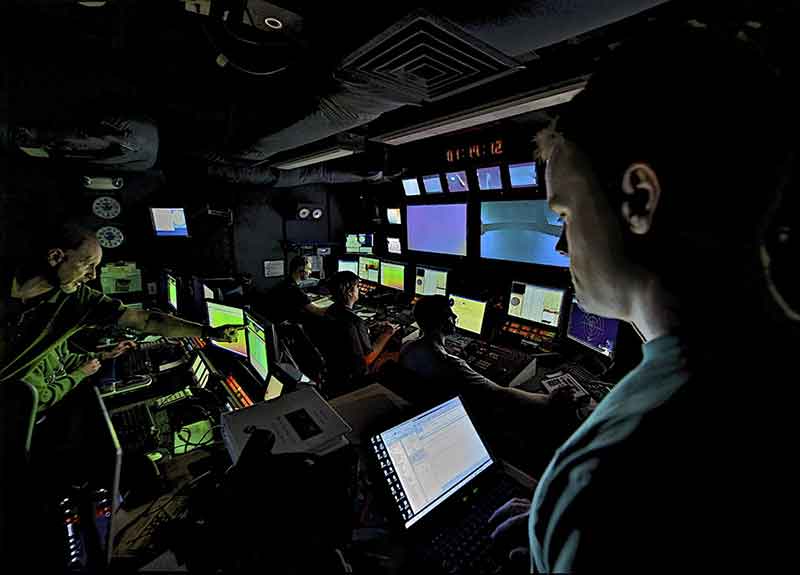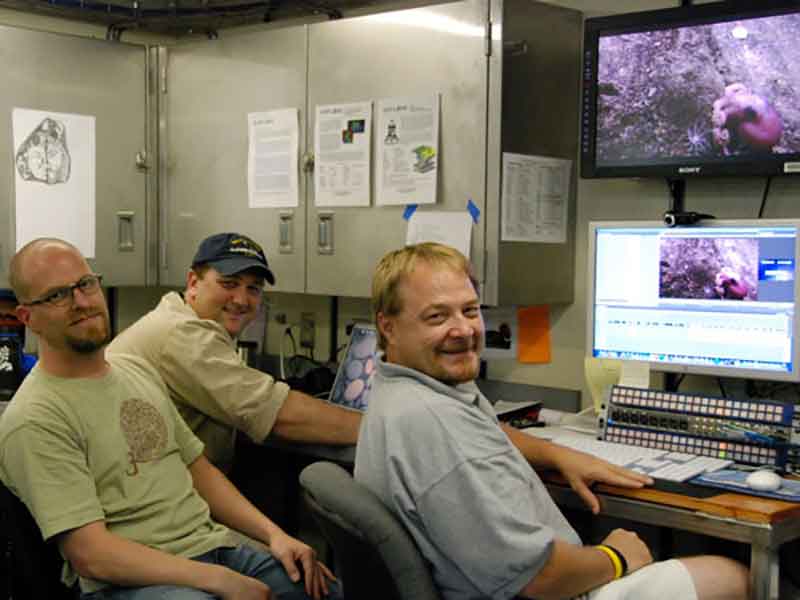
by Colleen Peters, Senior Survey Technician
July 27, 2010

Marine mammals are observed far and few between when in the deep ocean. These dolphins were spotted on the transit from Bitung to the working grounds in the Celebes Sea. Image courtesy of the NOAA Office of Ocean Exploration and Research, INDEX-SATAL 2010. Download image (jpg, 37 KB).
Going to sea can be a lot like band camp (and I should know—I went four times!). It generally takes place during the summer (field season). You pack up your instruments (scientific equipment) and personal effects, move to a remote location such as a campground (ship) upstate (offshore) where you won’t be distracted by the outside world (newspapers and TV) and where everyone works together to focus on the new show (mission).
Every day you get up excruciatingly early (watch schedule) and each section – percussion, horns, woodwinds (deck, survey, engineering) – will split off and do their own thing for a while, be it to work on a piece of music (develop procedures), practice marching (maintenance), and then put the two together (field trials) out on the field (survey area).
The upperclassmen (plank owners) will show the freshmen (greenhorns) how to hold their instruments (collect the data) and march properly (seamanship). Every day, the whole band (mission and ship’s crew) gets together and practices what they learned individually and as a unit to see how it fits together as an entire group (conduct operations).

Members of the Deck Department recover the camera platform while the remotely operated vehicle is trailing behind the ship. This operation involves the Officer of the Deck to drive the ship, a winch operator, and several people on deck to handle the equipment and taglines as the gear comes over the side of the ship. Image courtesy of the NOAA Office of Ocean Exploration and Research, INDEX-SATAL 2010. Download image (jpg, 39 KB).
Throughout the day, the whole band eats meals together (mess deck), sleeps in cabins with bunk beds (staterooms), and are basically not out of sight of other band-mates (ship-mates) the entire time. Literally the only place to go to get some peace and private time is the bathroom (head), except that someone is inevitably taking her sweet time, and you have to wait your turn. This schedule is repeated daily.
When the whole week (cruise) is over, they put on a show (highlight video or other cruise products) for all the parents (scientists) at home (on shore) to show them what they have been doing the whole time they were away. Sometimes parents (scientists) will attend (telepresence) the camp (cruise) and offer suggestions, advice, or general comments on how well it sounds or looks (data quality analysis).
You can’t pick your cabin mates, section leader (supervisor), or peers. Sometimes, a really difficult section of music (piece of equipment) will hold up (break) the whole band (ship), and the director (commanding officer) won’t move forward (delay a cruise) until you have collectively mastered it (made repairs).

The ROV Navigator, Pilot, and Co-Pilot monitor the vehicle and camera controls as the camera platform and ROV are recovered at the end of a dive. They are in constant communication with the deck in case there are any problems encountered during the operation. Image courtesy of the NOAA Office of Ocean Exploration and Research, INDEX-SATAL 2010. Download larger version (jpg, 416 KB).
If the set design (cruise plan) being formed by the marching sections (mission team) doesn’t work at a certain point in the music (cruise), the designer (operations officer) will simply change it to accommodate the conditions. For example, if two clarinets quit and a trumpet player switched to the drum line, they may decide that the circle needs to become a triangle (the camera broke on the ROV so we will map the seafloor instead) and change a few people’s positions (line plan) on the field (survey area). Sometimes, the marching practice gets rained out (like a squall at sea) and the instruments get broken or need new parts, like a reed on a saxophone (or a new cable for the CTD), at which point everyone needs to be flexible to move to a new area, such as indoors (new survey area) and work on music instead (contingency cruise).
By the end of the week (cruise) everyone (everyone) is ready to go home. You work way more hours on the new show (mission) at band camp (sea) than you would ever have at home in one big chunk of time. You are sunburned, tired, achy, and can’t possibly look at another piece of sheet music (data) or your head will just explode. The food seemed good at first, but after many days of eating at the same (only) place, you eventually get tired of it and desire the ability to simply make your own choices. Now imagine going to a three-week band camp with a couple of days in between for 10 months a year. Who’s ready?

The video post-production engineers process all of the video collected from an ROV dive and prepare the footage for archive and distribution. The equipment in the control room and dry lab are similar to that found in a TV production studio. Image courtesy of the NOAA Office of Ocean Exploration and Research, INDEX-SATAL 2010. Download image (jpg, 32 KB).
I may joke about all of this, but the truth of the matter is that I look back at band camp with fond memories. The same goes for being at sea. Having already spent two years on the Okeanos Explorer, I remember some miserable days pitching and rolling, hardly able to handle my footing (as well as my lunch), much less the task at hand. There have been many a night of lost sleep and several mornings of early rises.
Although some struggles are never get forgotten, the bonds between your band-mates (ship-mates) never disappear. The experiences you have with people surviving tough situations make the amazing moments that much more spectacular. Every now and again, something remarkable happens—a sunset, a great video from the ROV, or discovery of a plume in the multibeam—which reminds me why I keep coming back for more.